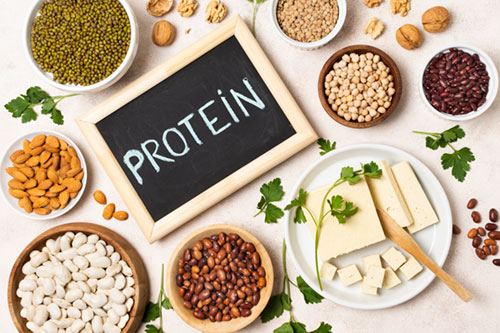Protein is an important macronutrient that is required at all stages of an individual’s life. It plays a major role in the functioning and maintenance of the human body. Protein serves as the building block for RNA and DNA, complex enzymes, hormones, and muscles. It is essentially needed from head to toe, including nails. The Indian population has made progress in overcoming protein deficiency, but there is still a common opinion regarding the superiority of animal proteins over plant proteins, or vice versa. Some believe that incorporating extra supplementary proteins in the form of nutritional supplements is mandatory to meet protein demands.

Normal Requirement of Protein:
- Adult men and women: 0.8-1 gm/kg/ideal body weight (RDA 2020).
- Pregnancy:
- 2nd trimester: +9.5 gm
- 3rd trimester: +22 gm
- Lactation:
- 0-6 months: +16.9 gm
- 7-12 months: +13.2 gm
- Certain critical cases and vulnerable groups may require customization, with protein needs ranging from 1.2 gm to 2.5 gm/kg/ideal body weight.
ANIMAL SOURCES OF PROTEIN:
Milk, Yogurt/Curd, Cheese, Eggs, Poultry, Beef (Red), Goat, Lamb (Red), Pork (Red), Fish, and other seafood.
PLANT SOURCES OF PROTEIN:
Whole grains, Legumes, Lentils/Dal, Seeds (such as sunflower and flax seeds), Nuts, Vegetables, and other plant sources.
TYPES OF PROTEIN:
Proteins are made up of simpler units called amino acids.
- Essential (indispensable amino acids): These cannot be synthesized by the body and must be obtained from food.
- Nonessential (dispensable amino acids): These are needed in minimal quantities and can be synthesized within the body from other amino acids.
- Conditionally essential (indispensable amino acids): The body requires these amino acids under special conditions such as pregnancy, lactation, certain illnesses, or when the demand for amino acids increases.
Plant Protein Vs Animal Protein:
- A balanced diet rich in plant protein reduces the risk of non-communicable diseases.
- Plant protein is high in phytonutrients, which are more beneficial to health.
- Recent evidence suggests that plant protein is safer for consumption by kidney patients compared to animal protein.
- Foods containing plant protein complement each other for quality, such as the combination of pulses and rice (Pongal/Sambar rice, peas pulao, etc.).
- Soy protein is one of the best vegetarian proteins, providing all nine essential amino acids (100g provides 37g of protein) of high biological value.
- Some disadvantages of plant protein include the presence of certain anti-nutrients that can cause leaky gut and protein maldigestion due to protein inhibitors.
- Certain inhibitors and phytates can affect carbohydrate absorption.
- Proper soaking and cooking can minimize these effects.
- Plant protein has lower digestibility as it is meshed with fibre, other plant components, and anti-nutrients, which slows down the bioavailability of amino acids.
- Vegetarians may need to increase their protein consumption (1-1.2g/kg/IBW) to meet essential amino acid demands.
- Incorporating plant protein isolates or concentrates, in addition to the regular menu, can provide up to 20g of protein per serving.
- Animal protein contains saturated fat and cholesterol, which are considered negative qualities more prone to non-communicable diseases. Therefore, moderation is key, with portion control being important. Poultry, lean meats, egg whites, and fish are exceptions with lower saturated fat content.
Special notes:
- The three common forms of protein supplements available in the market are whey, soy, and casein protein. Whey is the most commonly used as it is a water-soluble protein and provides complete protein necessary for human dietary needs. Soy protein can be a substitute for whey proteins, but it may have an unpleasant taste and does not dissolve well in water.
- Protein supplements are recommended in certain situations:
- Athletes, sports persons, and regular gym-goers who engage in intense physical activity for more than an hour to fuel their bodies.
- Individuals who have undergone hospitalization due to critical illness or surgery, where their food intake is minimal and unable to meet daily energy and protein requirements.
- For proper muscle protein synthesis, around 20-40g of protein intake is needed at least twice a day. Muscle-building protein, which includes essential amino acids, can be obtained through a combination of regular protein-rich foods with high biological value and supplements.
- When considering protein supplements, it is essential to consult authenticated professionals for choices and recommendations to avoid overdoing or underdoing protein intake.

Yamini Gali, MSc., RD
Lead – Clinical Dietician
Kauvery Hospital Chennai

